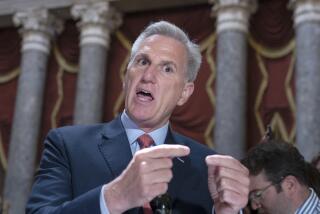Obama to draw sharp contrast with GOP over deficit
Reporting from Washington — President Obama will call for shrinking the nation’s long-term deficits by raising taxes on wealthier Americans and requiring them to pay more into Social Security, drawing a barbed contrast with a Republican plan to save money by deeply slashing Medicare, Medicaid and other domestic spending.
Obama will offer some spending cuts, including trims to the Pentagon’s budget, but his speech Wednesday is likely to provide Americans with a vivid choice between higher taxes or fewer benefits, issues that will color the national debate straight through the 2012 election.
The debate has little middle ground and poses substantial political risk for both sides.
Democrats hope to repeat the experience of 2005, in which President George W. Bush’s proposal to privatize parts of Social Security proved to be a staggering miscalculation that cost his party heavily in the next year’s election. They think voters will not accept a Republican proposal put forward by Rep. Paul D. Ryan (R-Wis.) that would replace guaranteed Medicare benefits with a limited voucher.
Republicans, at least some of them, argue that the country is in a different place than it was six years ago, when the economy appeared to be on a never-ending roll. Now, they say, voters have awakened to the reality that the government’s fiscal house must be put in order. Americans concerned about runaway spending are prepared to rework the longstanding social contract between the government and themselves rather than accept higher taxes, they say.
Even Ryan, however, recognizes that his plan could backfire.
“Everyone tells me that I’m giving our political adversaries this massive political weapon to use in the next campaign,” he told the Chicago Tribune editorial board Monday. “Yeah, we are. But you know if you don’t start fixing these things …”
Obama would end tax breaks for households earning more than $250,000 a year, trim Pentagon spending, lift a cap on the amount of income that is assessed for Social Security, and save on Medicare and Medicaid through alterations to healthcare delivery, administration officials said. He will speak about 1:30 p.m. Eastern time on the campus of George Washington University.
Apart from showing voters he is committed to cutting the deficit — a popular position — Obama has another purpose in rolling out his plan this week. Aides said he was thinking ahead to a vote on lifting the nation’s debt ceiling and wanted to win over wavering voters by meeting one of their priorities: deficit reduction.
The debate over the debt ceiling is shaping up to be even thornier than last week’s battle over the 2011 budget, which nearly forced a government shutdown. Many Republicans and some Democrats see the debt as a symbol of governmental excess, shunning arguments that failing to increase the limit would trigger economic bedlam.
“There is no way a debt limit increase could pass the House unless accompanied by cuts [and] reforms,” a House Republican leadership aide said Monday. “A vote on a ‘clean’ debt limit increase would fail — period — and then what would happen to world markets?”
Obama’s address comes as the House prepares to vote on Ryan’s plan to slash spending by $5.8 trillion over the next decade.
Much of the projected savings in that plan would be reached by wiping the new healthcare law off the books, a move Republicans say would eliminate billions of dollars of new spending, now scheduled to help approximately 32 million uninsured Americans get healthcare coverage over the next decade.
Ryan would also cut more than $700 billion over the next decade from federal support for Medicaid by converting the program serving poor people into a block grant administered by states.
And beginning in 2022, Ryan would privatize the Medicare program by giving seniors a subsidy to help them shop for commercial insurance. The nonpartisan Congressional Budget Office estimates the switch would save the federal government money but would dramatically expand how much seniors pay for healthcare out of their own pockets.
Democrats have criticized his plan, saying its tax breaks would largely offset its deficit reduction.
The 2012 campaign is barely underway, but the tax hikes vs. spending cuts debate is emerging as a major theme. Briefing reporters Monday, White House Press Secretary Jay Carney said there were class issues underlying the Ryan budget plan.
“We strongly disagree with the lack of balance in Congressman Ryan’s approach,” Carney said. “It simply is not appropriate and it would not be supported by the American people to have a fiscal plan that relies on dramatic restructuring, reform of the kind of programs that provide security and health security to seniors and to poor people and to disabled people, and at the same time gives enormous tax relief, tax cuts to the wealthiest Americans.”
Republicans hope to gain traction against Obama by painting him as a classic liberal intent on raising taxes.
“We all agree that we need to address our fiscal crisis, but taxing families and business people is not the answer,” said House Majority Leader Eric Cantor (R-Va.). “We need to cut spending, address our insolvent entitlements programs, and tighten our belt by doing more with less.”
Noam N. Levey in the Washington bureau contributed to this report.
More to Read
Sign up for Essential California
The most important California stories and recommendations in your inbox every morning.
You may occasionally receive promotional content from the Los Angeles Times.











